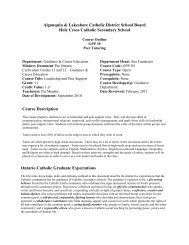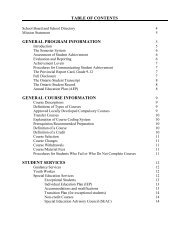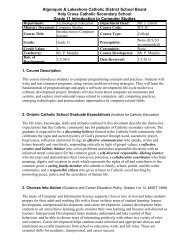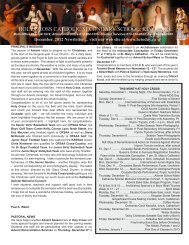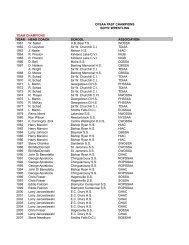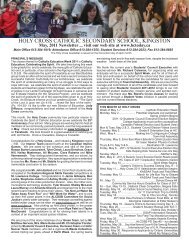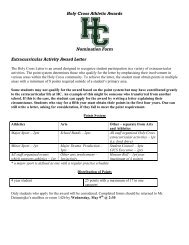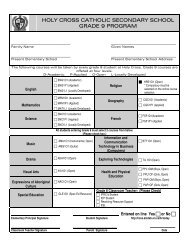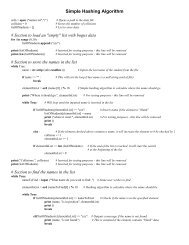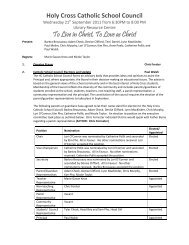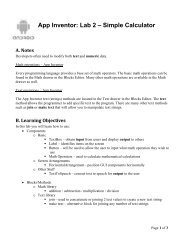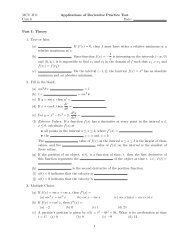NBV 3C
NBV 3C
NBV 3C
Create successful ePaper yourself
Turn your PDF publications into a flip-book with our unique Google optimized e-Paper software.
Algonquin & Lakeshore Catholic District School Board<br />
Course Outline<br />
School: Holy Cross Catholic Secondary School, Kingston<br />
Department Head: J. Drumm<br />
Ministry Document: Aboriginal Beliefs, Values and Aspirations in Contemporary<br />
Society Grade 11<br />
Course Code: <strong>NBV</strong><strong>3C</strong><br />
Course Title: Aboriginal Beliefs, Values and Aspirations in Contemporary Society<br />
Course Type: College<br />
Grade: Grade 11<br />
Prerequisite: Any University, University/College, or College Preparation course in<br />
Canadian and World Studies, English, or Social Sciences and Humanities<br />
Credit Value: 1.0<br />
Corequisite:<br />
Teacher(s): R. Manion<br />
Course Developer(s): R. Manion<br />
Date of Development: January, 2010<br />
Date Reviewed:<br />
Course Description:<br />
This course is designed as a study of how beliefs and values shape Aboriginal peoples’<br />
history, culture, and aspirations. This course elaborates on how values, beliefs, and<br />
spirituality form Aboriginal peoples’ identity and how colonial experiences have<br />
threatened and impacted on Aboriginal peoples. Students examine how Aboriginal<br />
peoples understand their natural and cosmological environment and explore hoe their<br />
world views and philosophies have had an impact on relationships with Euro-Canadian<br />
society both historically and in the present. The relevant topics of this course are<br />
representation, colonialism, world views, accomplishment, renewal, reconciliation, and<br />
revitalization. Students will use geotechnologies and skills of geographic inquiry and<br />
analysis to develop and communicate balanced opinions about the complex issues facing<br />
Aboriginals in Canada and in a world that is interdependent and constantly changing.<br />
How This Course Supports the Ontario Catholic School Graduate Expectations<br />
We live in a mutli-cultural global village. This global-village has not been created<br />
without its problems or celebrations. Canada, as a nation, has a key role and<br />
responsibility to the growth and prosperity for all citizens in this world/global village.<br />
As Catholics we have to ask ourselves how we respond to the challenges of these new<br />
frontiers of global citizenship. We, as responsible citizens and Catholics, cannot look
forward with improvements without assessing the past. These improvements must be<br />
made to ensure all citizens are respected in all facets of life.<br />
This course, through unit topics, will enhance our student’s global challenges and<br />
develop moral, ethical and a realistic mindset in decision-making and growth as citizens.<br />
Respect for community (common good), environment and Christian values are the<br />
cornerstones for developing the student’s future. This future will inspire hope, confidence<br />
and belief for a compassionate understanding global, national, local society.<br />
1. Overall Expectations for Student Learning<br />
By the end of this course students will demonstrate these understandings:<br />
- describe traditional and contemporary beliefs and values of Aboriginal cultures<br />
that influence present-day activities and behaviours<br />
- identify aspects of cultural identity related to specific Aboriginal peoples<br />
- compare Aboriginal and non-Aboriginal perspectives on the contemporary<br />
cultural identities of Aboriginal peoples<br />
- describe the efforts and actions of Aboriginal communities and individuals to<br />
maintain their cultures and languages within traditional land bases, on reserve,<br />
and in urban settings<br />
- explain how Aboriginal peoples’ relationship to the land traditionally sustained<br />
them in various environments across Canada<br />
- demonstrate an understanding of the cultural practices of Aboriginal peoples<br />
- explain how Aboriginal peoples’ links to the land and to a sustainable<br />
environment are part of their cultural identity<br />
- demonstrate an understanding of the varying perspectives on Aboriginal peoples’<br />
right to self-determination<br />
2. Units of Study<br />
Unit #1: Aboriginal Identity Overview: Perceptions and Realities<br />
Unit #2: Aboriginal Beliefs and Value Systems: The impact of Colonialism<br />
Unit #3: Leadership, Responsibilities, and Aboriginal Knowledge<br />
Unit #4: Pride, Power, and Accomplishments<br />
Unit #5: Renewal and Reconciliation<br />
3. Expectations Regarding Learning Skills<br />
An important key to success in this course is a positive attitude toward learning and to the<br />
investigative nature of the study of geography. Maximum use of class time is crucial to<br />
obtain the support of the teacher and peers. Homework will be the continuation of work<br />
begun in class and should be completed to obtain the practice and reinforcement needed<br />
to succeed on summative evaluations. In accordance with ALCDS Board policy, parents<br />
will be contacted when unsatisfactory learning skills place a student’s credit in jeopardy.<br />
Learning skills will be assessed accurately and rigorously in the following areas:<br />
- Responsibility - Self-regulation<br />
- Organization - Collaboration<br />
- Initiative - Independent Work
A student’s demonstration of learning skills will be reported separately from achievement<br />
of curriculum expectations using a four-point scale: E - excellent, G - good, S -<br />
satisfactory and N - needs improvement. Although learning skills may have an effect on<br />
achievement, evaluation of the learning skills will not be included in the determination of<br />
the student’s percentage grade.<br />
4. Supports for Higher Learning<br />
Whenever accommodations are made to address student learning needs, or alternative or<br />
modified expectations are identified for a student, these accommodations, modifications,<br />
or alternative expectations will be outlined in an Individual Education Plan (IEP) and will<br />
be communicated to parents.<br />
5. Career Education in Aboriginal Studies<br />
The knowledge and skills students acquire in this course will be useful in a variety of<br />
careers. A background in geography, history, politics, or law can lead to employment in<br />
fields such as law, politics, resource management, information technology, teaching,<br />
recreation, hospitality and tourism, and journalism. Students should be made aware of<br />
these possibilities and encouraged to explore areas of interest to them.<br />
6. The Importance of the Study of Current Events<br />
The study of current events forms an integral component of the Aboriginal studies<br />
enhancing both the relevance and the immediacy of the program. Discussion of current<br />
events not only stimulates student interest and curiosity but also helps students to connect<br />
what they are learning in class with past and present-day world events or situations. The<br />
study of current relevant events needs to be thought of not as a separate topic removed<br />
from the program but as an integral extension of the expectations found in the<br />
curriculum.<br />
7. Antidiscrimination Education in Aboriginal Studies<br />
The Aboriginal studies courses curriculum is designed to help students acquire the<br />
“habits of mind” essential for citizens in a complex democratic society characterized by<br />
rapid technological, economic, political, and social change. Students are expected to<br />
demonstrate an understanding of the rights, privileges, and responsibilities of citizenship,<br />
as well as willingness to show respect, tolerance, and understanding towards individuals,<br />
groups, and cultures in the global community and respect and responsibility towards the<br />
environment. They are also expected to understand that protecting human rights and<br />
taking a stand against racism and other expressions of hatred and discrimination are basic<br />
requirements of responsible citizenship.<br />
8. The Role of Technology in the Curriculum<br />
Information and communications technology (ICT) provides a range of tools that can<br />
significantly extend and enrich teachers’ instructional strategies and support students’<br />
learning in Canadian and world studies. These tools include simulations, multimedia<br />
resources, databases, and computer-assisted learning modules. Teachers can use ICT<br />
tools and resources both for whole class instruction and for the design of curriculum to<br />
meet diverse student needs.
ICT can be used to connect students to other schools, locally and abroad, and to bring the<br />
global community into the local classroom. Through Internet websites and CD-ROM<br />
technology, students can now access primary resources held in museums, libraries,<br />
archives, and public institutions across the country and around the world. ICT resources<br />
allow secondary students to conduct more far-ranging and authentic research than ever<br />
before.<br />
Applications such as databases, spreadsheets, word processors, enhanced with smart<br />
board and presentation software can be used to support various methods of inquiry. The<br />
technology also makes possible simulations of complex systems that are useful for<br />
problem-solving purposes or when field studies on a particular topic are not feasible.<br />
Students are able to develop job-related computer skills through the use of industry<br />
applications such as geographic information systems (GIS) and the global positioning<br />
system (GPS).<br />
9. Assessment and Evaluation of Student Achievement<br />
Assessment practices will be aligned with curriculum expectations and will incorporate a<br />
variety of appropriate and authentic assessment methods, strategies, and instruments.<br />
The Achievement Chart for Geography will be used to provide a reference point for all<br />
assessment practice, including the assignment of percentage grades. In accordance with<br />
ALCDS Board policy and the concept of assessment for learning, students will be given a<br />
variety of opportunities, appropriate to their learning needs, to demonstrate what they<br />
know and can do. Student achievement of the overall expectations will be evaluated in a<br />
balanced manner among the four learning categories:<br />
· Knowledge and Understanding · Thinking<br />
· Communication · Application<br />
ASSESSMENT, EVALUATION AND REPORTING<br />
2010 – 2011<br />
1. LEARNING SKILLS<br />
Responsibility<br />
Organization<br />
Independent Work<br />
Collaboration<br />
Initiative<br />
Self-regulation (we report on three at early semester report:<br />
Resp, Org, and Ind. Work – still use E,G,S or N)<br />
2. ASSESSMENT<br />
Assignments for evaluation will not include ongoing homework intended<br />
to consolidate skills<br />
Assignments for evaluation may include group work but not group-graded<br />
(individualized grades for group work)<br />
Student self-evaluation and peer evaluation may not be included in the<br />
grade.
Both mathematical calculations and professional judgment will inform the<br />
determination of percentage grades. Final grades will be a 70/30 split of<br />
course work and final evaluation(s)/activities (but see below for marks<br />
below 50 %).<br />
3. EVALUATION<br />
New conversion chart looks like this:<br />
Achievement<br />
4 +<br />
4<br />
4 -<br />
3 +<br />
3<br />
3 -<br />
Percentage<br />
Mark Range<br />
95 - 100<br />
87 - 94<br />
80 - 86<br />
77 - 79<br />
73 - 76<br />
70 - 72<br />
Achievement<br />
2 +<br />
2<br />
2 -<br />
1 +<br />
1<br />
1 -<br />
Percentage<br />
Mark Range<br />
67 - 69<br />
63 - 66<br />
60 - 62<br />
57 - 59<br />
53 - 56<br />
50 - 52<br />
***At midterm and at final reporting times, marks below 50 % are as follows:<br />
45 % indicates that the student was able to achieve some course expectations in limited<br />
way.<br />
40 % indicates that the student had difficulty achieving most of the course expectations.<br />
35 % indicates that the student had difficulty achieving any of the course expectations.<br />
(The next two are additional options for Grades 11 and 12 only.)<br />
30 % indicates that the student provided insufficient evidence of achievement of course<br />
expectations.<br />
20 % indicates that the student provided little or not evidence of achievement of course<br />
expectations.<br />
(The following is an option for Grades 9 and 10 students only.)<br />
“I” may be used to suggest credit recovery is needed in order for the student to achieve<br />
the credit. In this instance, the report card comment must be “the student has missed or<br />
failed to complete some evaluation activities and evidence of achievement is insufficient<br />
to warrant a credit.”
4. PLAGIARISM OR CHEATING<br />
Grades 11 and 12 – should plagiarism or cheating occur<br />
The student is informed by the subject teacher and the teacher will contact the<br />
parent/guardian, where appropriate.<br />
The assignment will receive a mark of zero. As determined by the teacher, an<br />
alternate assignment or form of assessment may be permitted to demonstrate<br />
achievement of the same curriculum expectations.<br />
The teacher will notify administration by completing an Academic Honesty<br />
Report.<br />
Administration will contact the parent / guardian.<br />
In Grades 9 through 12, should SUBSEQUENT INCIDENTS of cheating or<br />
plagiarism occur<br />
The student is informed by the subject teacher.<br />
The assignment will receive a mark of zero.<br />
The teacher will contact the parent/guardian, where appropriate.<br />
The teacher will notify administration by completing an Academic Honesty<br />
Report.<br />
Administration will meet with the student.<br />
Administration will inform the parents/guardians (where appropriate) by letter.<br />
LATE AND MISSED ASSIGNMENTS<br />
Early in the semester, teachers will remind students that they are responsible to submit all<br />
assignments in a timely manner. Teachers and school teams will use a variety of<br />
strategies to encourage students to submit assignments and meet timelines. Late or failed<br />
submissions will be noted on learning skills, and may be included on report card<br />
comments or, at times, in report card grades.<br />
Teachers will ensure due dates and timelines are reasonable and involve students where<br />
appropriate; they are clearly stated and communicated to students and parents/guardians<br />
when appropriate; provide checkpoints; encourage self-monitoring; involve<br />
consultations with other teachers in the school to avoid overlap; can be extended when,<br />
in the teacher’s professional judgment and in the best interest of the student, it is<br />
appropriate to do so.<br />
There are a number of proactive measures to encourage timely submission of<br />
assignments:<br />
Asking the student to clarify the reason for not completing the assignment<br />
Helping students to develop better time-management skills<br />
Collaborating with other staff to prepare a part- or full-year calendar of major<br />
assignment dates for every class<br />
Planning for major assignments to be completed in stages<br />
Maintaining ongoing communication with students and/or parents/guardians<br />
about due dates and late assignments; scheduling conferences where necessary<br />
Referring student to Student Success team or teacher<br />
Taking into consideration legitimate reasons for missed deadlines<br />
Setting up a student contract
Using counseling or peer tutoring to try to deal positively with problems<br />
Holding teacher-student conferences<br />
Reviewing the need for extra support for English language learners<br />
Reviewing whether students require special education services<br />
Requiring the student to work with a school team to complete the assignment<br />
For First Nation, Metis, and Inuit students, involving Aboriginal counselors and<br />
members of the extended family<br />
Understanding and taking into account the cultures, histories, and contexts of<br />
students and their families’ previous experiences with the school system<br />
Providing alternative assignments or tests/exams where, in the teacher’s<br />
professional judgment, it is reasonable and appropriate to do so<br />
Deducting marks for late assignments, up to and including the full value of the<br />
assignment.<br />
In brief,<br />
Teachers will set due dates and deadlines. All assignments and activities are due on<br />
the date specified by the teacher. In cases of lateness, a teacher may use a mark<br />
penalty deduction of up to one level. Once a class set of assignments has been<br />
returned to students, a teacher is under no obligation to accept late assignments.<br />
For missing assignments, the mark deduction can be the full value of the<br />
assignment; however, teacher must conference with the student and contact<br />
parents/guardians (where appropriate) before assigning the full-value deduction.<br />
Students who are absent must discuss the missing evaluation activity with their<br />
teacher and any subsequent consequences. Teachers will record an “I” for missing<br />
evaluation activities. Incomplete assignments will be considered when determining<br />
the student’s overall grade at mid-term and final reporting times.<br />
See Section 16 of ALCDSB Assessment, Evaluation and Reporting – Grades 1-12<br />
Administrative Procedures, September 2010, for details.<br />
Thirty percent of the grade will be based on final evaluation in the form of an<br />
examination (20 %) and a culminating task (10%).<br />
10. Key Dates, Special Events, Additional Considerations:<br />
Field trips which will enrich and support the course material.<br />
11. Teaching / Learning Strategies<br />
Students learn best when they are engaged in a variety of ways of learning. Aboriginal<br />
Studies courses lend themselves to a wide range of approaches in that they require<br />
students to research, think critically, work cooperatively, discuss relevant issues, and<br />
make decisions about significant human concerns. When students are engaged in such<br />
active learning strategies, they tend to retain knowledge for longer periods and to develop<br />
meaningful skills. Active learning strategies also enable students to apply their<br />
knowledge and skills to real-life issues and situations.<br />
Some of the teaching and learning strategies that are suitable to material taught in<br />
Canadian and world studies are fieldwork (including data collection), cooperative small-
group learning, role playing, simulations, brainstorming, mind mapping, creating<br />
scenarios for decision making, independent research, personal reflection, seminar<br />
presentations, Socratic lessons, and constructive or creative dialogue. In combination,<br />
such approaches promote the acquisition of knowledge, foster positive attitudes towards<br />
learning, and encourage students to become lifelong learners.<br />
12. Learning Resources<br />
The Ontario Curriculum, Grades 11 First Nations, Inuit, and Metis Peoples, Exploring<br />
Their Past, Present, and Future Emond Montgomery Publilcations Limited, Toronto,<br />
Canada, 2006<br />
13. Board, School, Department and Classroom Policies<br />
The following policies apply to this course:<br />
® Administrative Procedures. October, 2005. Secondary School Policy for<br />
Assessment, Evaluation, Grading and Reporting, Grades 9-12, 2005-2006.<br />
® School Evaluation Policy (if available)<br />
® Social Science Department Evaluation Policy (if available)



